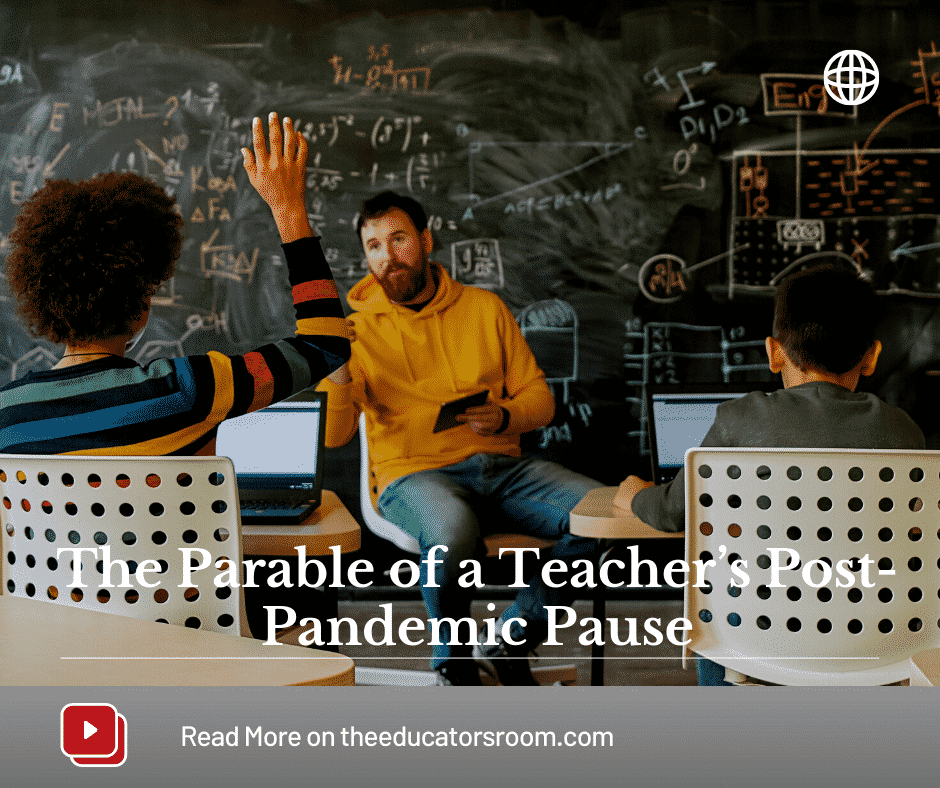“I gotta fight every night to prove my love!” I will never forget this scene from the movie The Five Heartbeats when the boyfriend comes back to the table and find his girl with another man. Now, how in the world am I going to relate that line to teaching? For those of us in this “fight”, we may feel like we are constantly fighting to prove our dedication, qualifications, and our worth! It seems like many still cannot decide if we are allies or villains from one moment to the next! If I have learned nothing else from this pandemic, it is that we all have a story to tell.
The best advice I can give those who are reimagining a post-pandemic life and trying to figure out if they can survive another extreme “shift” in education, is to pause.
Teachers already persevered through ever-changing standards, No Child Left Behind (NCLB), Every Student Succeeds Act (ESSA), only to be hit with a global pandemic that threw us into a world of distance education I doubt even the most tech-savvy of us were completely prepared for. One of the most important things teachers learned to do post-pandemic, was to pause.
We paused to think about how the mental health of both teachers and students was finally being highlighted.
We paused to think about how education was finally being fully funded (albeit temporarily).
We paused to think about how systemic change was now being focused on.
And we turned those pauses into a full-fledged re-set!
While a pause may be defined as a brief and temporary interruption, the use of a post-pandemic pause has become one of the most important tools in a teacher’s toolkit.
Watching a heated school board meeting?
Pause.
Sitting in a virtual faculty meeting where the Chat has turned some educators into what the kids these days call “Internet Gangstas”?
Pause.
Feeling overwhelmed to the point where we want to quit?
Pause.
I am looking to this upcoming school year as a huge ball of potential, praying for positive, and sustainable, shifts in education. The power of a pause can be a type of mental regrouping, and in some cases, a career saver. Post Pandemic Pauses have made me re-think and reflect on so much of my career, and my future in education.
Parables are simple stories used to illustrate a moral or spiritual lesson, but there is nothing simple about the pandemic we are just now beginning to see the ending of (Oxford English Dictionary). The stories teachers will share after what we have gone through this past year and a half will be extraordinary, and potentially unbelievable. A Biblical Parable might help to guide our efforts to both pause and reflect.
One of the most famous parables in the Bible is the Parable of the Prodigal Son. I ask us to look, however, at the Parable of the Sower (Matthew 13). Whether we look at the Old Testament version (Genesis 26:12-13) or New, the messages in the parables mirror. In this respect, I will take a metaphorical view of the Parable of the Sower. One’s efforts to teach the masses could sometimes feel like spreading “seeds” of knowledge on an unpredictable path, hoping and praying that it falls on “good ground”, in this case, a receptive student who is willing to learn. This pandemic has shown us that if we focus on the path, we might lose sight of our purpose. Staring into a sea of black boxes has discouraged the best of us, but as I stated in “Black, Square Boxes”, we never know the potential impact we are having behind them. We need to pause, focus on why we got into education in the first place, and know that while this pandemic may be the most globally impactful shift we have had in education, it will not be the last.
Change is inevitable in education, but it does not always have to be something we dread. What this pandemic has also taught us, is that if we are hoping for systemic change, it often begins with the teachers. I would advise the powers that be to join us in our post-pandemic pause, recognize that teachers are the experts in education, and utilize our degrees, credentials, and experience to guide policies, procedures, and post-pandemic practices. In the words of Barack Obama, “Change will not come if we wait for some other person or some other time. We are the ones we’ve been waiting for. We are the change that we seek.”






